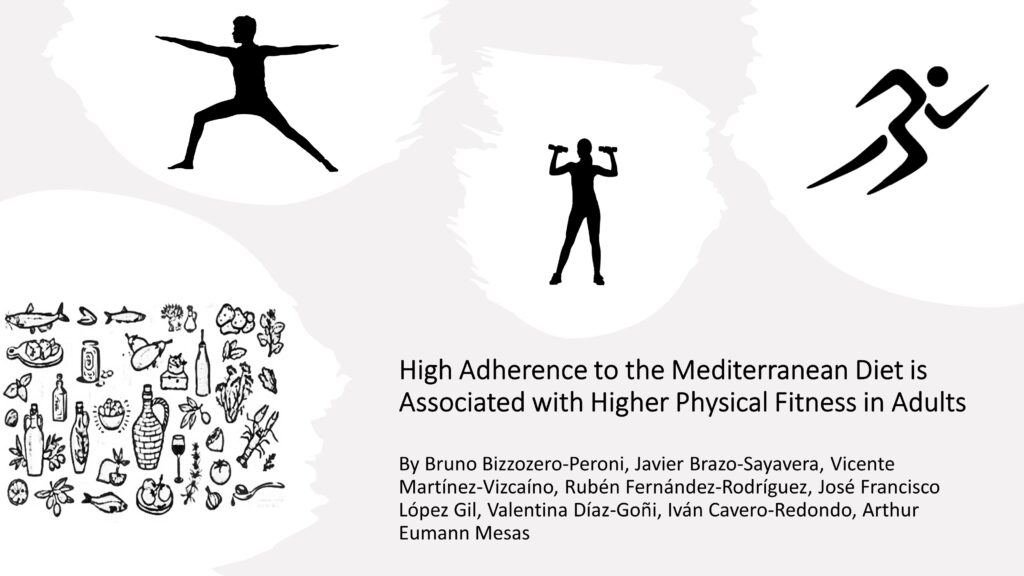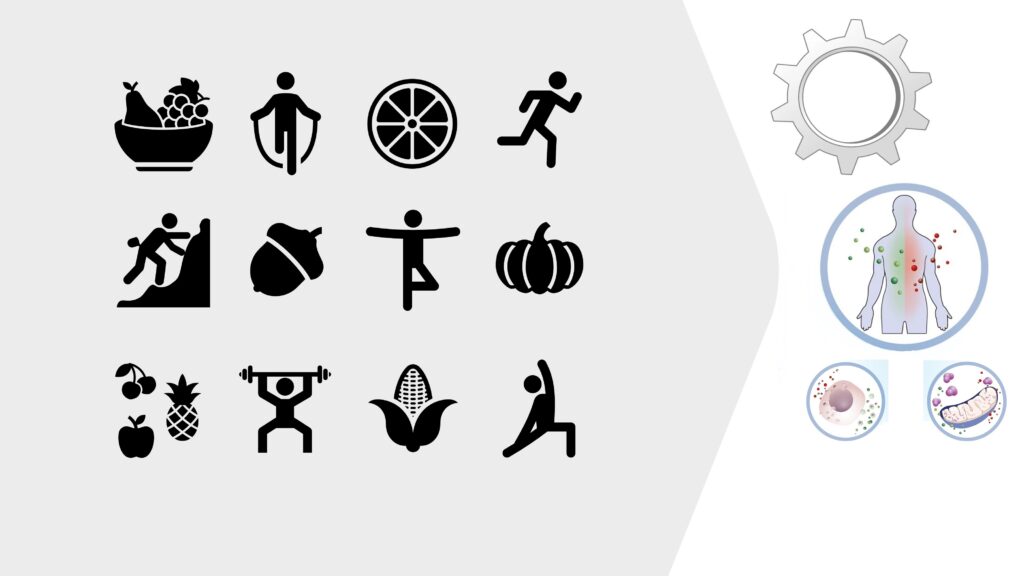By Bruno Bizzozero-Peroni, Javier Brazo-Sayavera, Vicente Martínez-Vizcaíno, Rubén Fernández-Rodríguez, José Francisco López-Gil, Valentina Díaz-Goñi, Iván Cavero-Redondo, Arthur Eumann Mesas

Health-related physical fitness (hereafter ‘fitness’) is a crucial indicator of health. The main elements of fitness (i.e., person’s ability to perform physical activity) are cardiorespiratory fitness (i.e., aerobic capacity), musculoskeletal fitness (e.g., flexibility, muscular strength), and motor fitness (e.g., agility, balance) (1). Both improvement and high fitness levels have been repeatedly linked to favorable health over the entire adult lifespan (2). In addition, fitness levels are related to modifiable lifestyle behaviors such as physical activity or dietary habits, and therefore, all individuals can improve them throughout adulthood.
The Mediterranean diet, mainly considered a plant-based food matrix, is a strong scientific concept associated with several beneficial health outcomes, such as reduced total mortality and reduced risk of some cancers, cardiovascular and neurodegenerative diseases and diabetes (3). Adherence to the Mediterranean dietary pattern was previously associated with fitness in a meta-analysis of studies conducted in children and youth (4). However, until now, a comprehensive picture of the associations between adherence to the Mediterranean diet and fitness levels along with each of its components (cardiorespiratory, musculoskeletal, and motor) in adulthood had not been synthesized. Therefore, we performed a systematic review with meta-analysis to provide updated evidence on these associations.

After analyzing the scientific literature comprising 30 studies conducted with 36,807 adult participants, some conclusions were drawn. First, a significant positive association was found between high adherence to the Mediterranean diet (compared to low adherence) and higher fitness levels in both cross-sectional and longitudinal observational studies. Second, according to each fitness indicator, the Mediterranean diet was associated with improved cardiorespiratory fitness (cross-sectional association), musculoskeletal fitness (cross-sectional and longitudinal association), and motor fitness (cross-sectional association in populations from Mediterranean countries).
We can enunciate some possible explanations. The main elements of the Mediterranean food matrix (i.e., extra virgin olive oil, fresh fruits and vegetables, legumes, nuts, red wine, seeds, and whole grains) include a wide variety of antioxidant molecules that may contribute to fitness development through different pathways, such as reduced reactive oxygen species and proinflammatory cytokine expression (5,6). In addition, the influence of the Mediterranean lifestyle (e.g., adequate rest, regular practice of moderate physical activity, social support) could contribute to the impact of high Mediterranean diet adherence on fitness levels (4).
Our findings can be useful for researchers and health professionals responsible for adult lifestyle surveillance and health promotion. However, although the results are promising, we must be cautious because more long-term studies (especially cohort studies and clinical trials) are still warranted to confirm whether adherence to the Mediterranean diet can prospectively improve fitness regardless of potential confounders.
Read all in https://doi.org/10.1093/advances/nmac104
On behalf of all authors,
Bruno Bizzozero Peroni
I’m a research assistant at the Health and Social Research Center (University of Castilla-La Mancha, Spain), professor at the Higher Institute of Physical Education (University of the Republic, Uruguay), and a research associate at the National System of Researchers (National Agency for Research and Innovation, Uruguay). My academic background is as follows: Degree in Physical Education (2013–2016, University of the Republic, Uruguay), Master’s in Physical Activity and Health (2017–2018, University of Cadiz, Spain), and PhD student at the Health and Social Research Center (2021–present, University of Castilla-La Mancha –grant co-financed by the European Social Fund–, Spain).
References
- Ruiz JR, Castro-Piñero J, Artero EG, Ortega FB, Sjöström M, Suni J, et al. Predictive validity of health-related fitness in youth: a systematic review. Br J Sports Med. 2009;43(12):909–23.
- Lavie CJ, Kachur S, Sui X. Impact of fitness and changes in fitness on lipids and survival. Prog Cardiovasc Dis. 2019;62(5):431–5.
- Dinu M, Pagliai G, Casini A, Sofi F. Mediterranean diet and multiple health outcomes: an umbrella review of meta-analyses of observational studies and randomised trials. Eur J Clin Nutr. 2018;72(1):30–43.
- García-Hermoso A, Ezzatvar Y, López-Gil JF, Ramírez-Vélez R, Olloquequi J, Izquierdo M. Is adherence to the Mediterranean diet associated with healthy habits and physical fitness? A systematic review and meta-analysis including 565 421 youths. Br J Nutr. 2020;1–12.
- Koelman L, Egea Rodrigues C, Aleksandrova K. Effects of Dietary Patterns on Biomarkers of Inflammation and Immune Responses: A Systematic Review and Meta-Analysis of Randomized Controlled Trials. Adv Nutr. 2022;13(1):101–15.
- Powers SK. Can antioxidants protect against disuse muscle atrophy? Sport Med. 2014;44(Suppl 2):155–65.

